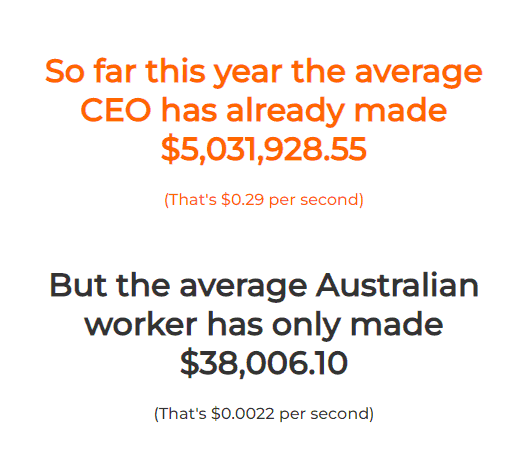The evidence is in: this cost-of-living crisis could have been prevented if corporate giants had put people over profit.
In fact, rising prices are being primarily caused by corporations jacking up their profits.
While big business tries to mislead us into thinking workers and pay increases are responsible for the cost-of-living crisis, the latest research from The Australia Institute shows us that big companies are at the root of the cost-of-living crisis.
Not only have CEOs in Australia pocketed an average annual pay of $9.15 million, but they’ve also tried to avoid increasing wages for their lowest paid workers.

The Australia Institute chief economist Dr Richard Denniss explains that wages have made no contribution to Australian inflation in for the past two financial years.
“Australia isn’t experiencing a wage-price spiral, it’s at the beginning of a price-profit spiral,” he says.
But the corporate bosses are right about one thing: inflation doesn’t just appear out of nowhere. It is created through decisions made by corporate executives.
“It is rising profits, not rising costs, that are driving Australia’s inflation. While workers are being asked to make sacrifices in the name of controlling inflation, the data makes clear that it is the corporate sector that needs to tighten its belt,” Denniss says.
The report acknowledges that while prices must be able to cover productions costs, “there is no direct link between costs of production and prices beyond the desire of firms to maintain, or increase, their profits.”
“Indeed, the rising profit share of GDP suggests that Australian firms have, for some time, been choosing to increase their prices faster than their costs have been rising. By definition this causes higher inflation.”
The report follows in the footsteps of the European Central Bank who found a similar pattern occurring across Europe: business profits are a key contributor to inflation.
So, when big business put their hands up to claim they have “no choice” but to crank up prices, we know better than to fall for it.
Million-dollar bonuses while outsourcing workers? It doesn’t stack up
Taking home $1.1 million in wages is more than most of us could ever dream. But that dollar figure is merely the bonus Qantas Domestic and International CEO Andrew David is set to receive.
Awarding David with such a vast worth in shares was made just one month after Qantas failed to overturn a Federal Court decision that it illegally sacked and outsourced nearly 2,000 ground and baggage crew. The court held Andrew David as the person responsible.
Qantas continues to refuse reinstating the workers it illegally outsourced who have yet to receive compensation. A Transport Workers Union survey found around half of the former Qantas workers are either still unemployed or relying on casual work.
Qantas is far from the only business paying its executive staff lucrative salaries while keeping the majority of employees on low wages and in insecure jobs.
Members of the National Tertiary Education Union are calling out management at Australian universities for raking in massive surpluses while refusing to address underpayment and exploitation of employees.
Members of the NTEU been winning back stolen wages long before the pandemic hit, recovering millions of dollars.
But just like unscrupulous bosses in big business, management at Australia’s academic institutions have continued to abandon and undervalue their workers.
When the University of Newcastle reported a 2021 surplus of more than $185 million, NTEU members were shocked. The same university had sacked hundreds of staff, using the pandemic as a pretext.
Similarly, the University of Sydney reported a 2021 surplus of $1 billion dollars while denying job security and fair pay to their workers.
Union members at the University of Sydney went on strike on May 11, linking arms with students for 48 hours.
In the lead up to National Reconciliation Week, members went on strike again, this time for improved rights at work for Aboriginal and Torres Strait Islander people. This action highlighted the need for better cultural safety for First Nations staff and the need to alleviate the cultural load.
Workers in unions continue to stand with their co-workers because we know using our collective power is the most effective way for all of us to move forward.
Workers will always win against corporate profiteering
How do we know collective action works? Workers in unions have taken on dodgy companies – like Qantas, Amazon, Country Road, Esso – and come out on top.
This is what we do day in, day out. While corporate giants rake in the profits that cause inflation to soar, union members are showing up to ensure no worker is left behind.
Being part of a union gives you collective bargaining power. That means working with union representatives who can help you negotiate better terms and conditions, like increased pay and improved leave entitlements.
From community and service workers to technicians and trades, workers in unions continue to negotiate higher pay in ways that ensure all members get a fair wage.
Cover photo credit: Adeolu Eletu on Unsplash











SHARE:
Corporate profits are the main cause of the cost-of-living crisis